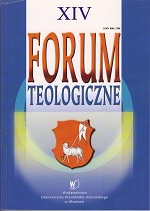Muzyka. Od recreatio do contemplatio
Music. From recreatio to contemplatio
Author(s): Jacek BramorskiSubject(s): Christian Theology and Religion
Published by: Wydawnictwo Uniwersytetu Warmińsko-Mazurskiego w Olsztynie
Keywords: music; relaxation; recreation; contemplation; otium.
Summary/Abstract: Ancient thinkers, especially Aristotle, underlined the meaning of music in relaxation as the inner ”revival” of a human being. Music had an important place in the Aristotelian concept among the four disciplines constituting the basis of education (grammar, gymnastics, music and drawing). It was not as the other three disciplines subordinated to some activity or useful purpose, but taught the human being how to relax in a decent way. Music did not constitute the component of common entertainment but characterized the attitude of diagogé, in which pleasure joined in beauty in an ethical sense. In Roman culture, it was expressed by the Latin term otium - indicating first of all the freedom of planning your time. In ancient thought, the understanding of relaxation supplied by music (otium musicum) did not restrict itself to recreational dimension only, but referred to the deeper spiritual sense. For music led the human being to contemplating beauty. That conviction was undertaken in the thought of the Church Fathers, especially St. Augustine. The Bishop of Hippo showed it in the dialogue About music as a philosophical discipline, which constitutes the basic condition of contemplation by clearing the mind and moral rebukes. Medieval theology also comprehended music not only as an esthetic form of entertainment, but first of all as the expression of cosmic harmonia mundi, finding its reflection in the spirituality of a person. Music as one of the ways of inner revival (recreatio), leads the human being to contemplation (contemplatio), in other words, to the attitude of admiration over the mystery of God. Such understanding of music reveals its theological dimension – as via pulchritudinis.
Journal: Forum Teologiczne
- Issue Year: 2013
- Issue No: 14
- Page Range: 35-49
- Page Count: 15
- Language: Polish

